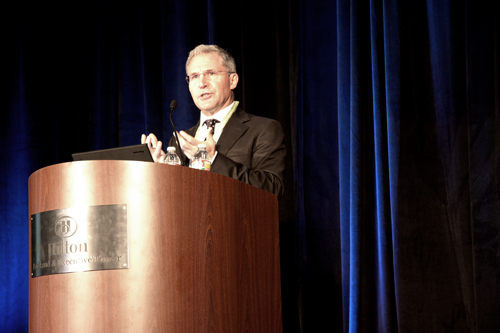The discussion of Antarctic climate change is heating up at Portland State.
PSU hosts first Open Science Conference held in US
The discussion of Antarctic climate change is heating up at Portland State.
Portland State hosted the fifth biannual Open Science Conference and 32nd Scientific Committee on Antarctic Research meeting, which kicked off July 16 with a series of four lectures open to the public at the Hilton Portland & Executive Tower.

The event marks the first time the Open Science Conference has been held in the United States and the first time SCAR has met in the U.S. since 1986.
“This is a unique opportunity for the United States to host the global community,” said Christina Hulbe, who chairs PSU’s Department of Geology and the local organizing committee.
Over 900 researchers from around the world—the top minds in the field—attended the conference.
In 2008, the U.S. made a bid to host the conference, and then three different universities, including PSU, applied to host.
“The fact that it was awarded to PSU, I think, reflects the caliber of researchers at PSU,” said David Santen, a PSU spokesman.
The lectures served as an overview, presenting the new, big ideas in the science. Major themes throughout the talks were the effects of climate change in the Antarctic region and policy recommendations for international collaboration in Antarctica.
“PSU is growing, so the conference seemed appropriate as PSU is appearing on the international stage,” Hulbe said.
Several changes in the event’s structure were made this time, Hulbe said. The open sessions were new and had a number of free registrations for students to promote student involvement. Teachers in the kindergarten through 12th grade range were also invited to the conference.
The emphasis on the arts at the conference was also new and included a photo exhibit, music and even films.
“We tried to bring the meeting out into the city,” Hulbe said.
Andrew Fountain, professor of geology and geography, was a key part of PSU’s involvement at the event. He presented two papers at the conference, both about a dry valley, or polar desert, in Antarctica, which he described as a “cold Sahara Desert.” Because the area is sandy and gravelly, it is one of the few places on the continent that geology can be researched, he said.
It’s possible that climate change has begun to affect this area, where streams have carved into the surface and rapidly eaten through the deposit of buried ice, Fountain said.
The changes in the region may be the first signs that glaciers in the area are losing mass and retreating, he explained.
As the valley warms, it will be open to change as the ice melts, so Fountain aims to map where the buried ice is to anticipate the climate change. The increase of solar radiation, rather than temperature variation, is the cause of these changes.
Fountain said the conference was both stimulating and anxiety-inducing, as PSU had to manage hosting duties.
“It is a lot of fun. You see a lot of colleagues. It is like inviting them to your house; a gathering of old friends to your town,” he said.
Fountain hopes the public will learn that scientists are concerned about the changes in Antarctica and the surrounding ocean, as well as sea level rises and ecosystem changes.
“The idea is to involve the public to the fullest extent possible,” Fountain said.
“Lots of these findings directly impact the public. It is better to get this information from scientists rather than the media.”
As for the scientific community, Fountain hopes they gain an increased familiarity with each other, leading to increased coordination and collaboration.
The conference ended July 19, while SCAR continued to meet until July 25.
Eric Wirthlin, a graduate student in environmental sciences from the University of Nevada, attended the event. Wirthlin went to Antarctica in 2010 to research the effects of ozone depletion on algae.
“The science pulled me here,” Wirthin said. “I wanted to see what else is going on.”







